情态动词用法
- 格式:doc
- 大小:50.00 KB
- 文档页数:5
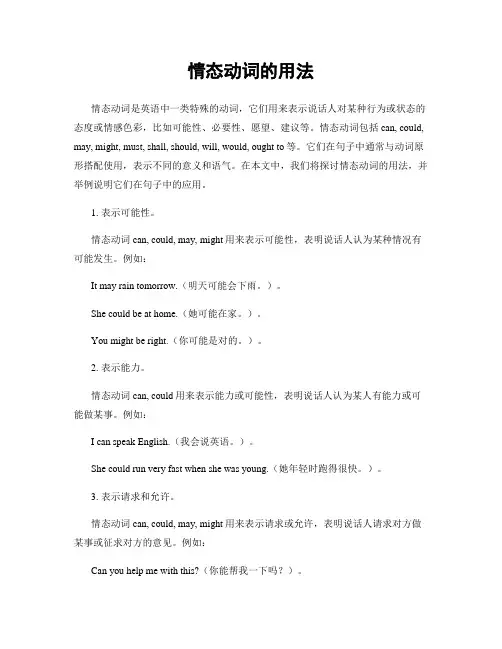
情态动词的用法情态动词是英语中一类特殊的动词,它们用来表示说话人对某种行为或状态的态度或情感色彩,比如可能性、必要性、愿望、建议等。
情态动词包括can, could, may, might, must, shall, should, will, would, ought to等。
它们在句子中通常与动词原形搭配使用,表示不同的意义和语气。
在本文中,我们将探讨情态动词的用法,并举例说明它们在句子中的应用。
1. 表示可能性。
情态动词can, could, may, might用来表示可能性,表明说话人认为某种情况有可能发生。
例如:It may rain tomorrow.(明天可能会下雨。
)。
She could be at home.(她可能在家。
)。
You might be right.(你可能是对的。
)。
2. 表示能力。
情态动词can, could用来表示能力或可能性,表明说话人认为某人有能力或可能做某事。
例如:I can speak English.(我会说英语。
)。
She could run very fast when she was young.(她年轻时跑得很快。
)。
3. 表示请求和允许。
情态动词can, could, may, might用来表示请求或允许,表明说话人请求对方做某事或征求对方的意见。
例如:Can you help me with this?(你能帮我一下吗?)。
Could I use your pen?(我可以用一下你的笔吗?)。
May I come in?(我可以进来吗?)。
4. 表示必要性。
情态动词must, should, ought to用来表示必要性或建议,表明说话人认为某种行为是必要的或值得做的。
例如:You must finish your homework before you go out to play.(你必须在出去玩之前完成作业。
)。
You should apologize to her.(你应该向她道歉。
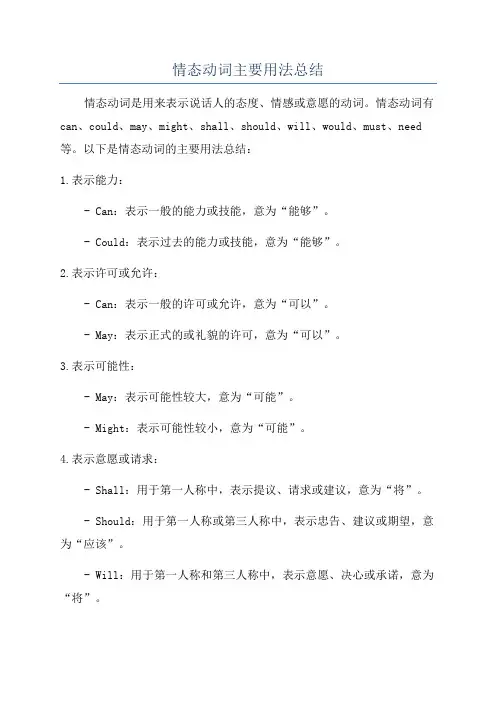
情态动词主要用法总结情态动词是用来表示说话人的态度、情感或意愿的动词。
情态动词有can、could、may、might、shall、should、will、would、must、need 等。
以下是情态动词的主要用法总结:1.表示能力:- Can:表示一般的能力或技能,意为“能够”。
- Could:表示过去的能力或技能,意为“能够”。
2.表示许可或允许:- Can:表示一般的许可或允许,意为“可以”。
- May:表示正式的或礼貌的许可,意为“可以”。
3.表示可能性:- May:表示可能性较大,意为“可能”。
- Might:表示可能性较小,意为“可能”。
4.表示意愿或请求:- Shall:用于第一人称中,表示提议、请求或建议,意为“将”。
- Should:用于第一人称或第三人称中,表示忠告、建议或期望,意为“应该”。
- Will:用于第一人称和第三人称中,表示意愿、决心或承诺,意为“将”。
- Would:用于第一人称和第三人称中,表示客气的请求、建议或愿望,意为“将”。
5.表示必要性或推测:- Must:表示必须性或应该性,意为“必须”。
- Should:表示推测、猜测或可能性较大的必要性,意为“应该”。
6.表示时间或条件:- Will/Would:表示未来时间或条件,意为“将/将会”。
7.表示推测或假设:- Must:表示肯定的推测,意为“一定”。
- May/Might:表示可能的推测,意为“可能”。
需要注意的是,情态动词本身没有人称和数的变化,后面的动词应为原形。
另外,他们常常与动词的原形连用构成谓语,可以用于各种句型,例如肯定句、否定句、疑问句等。
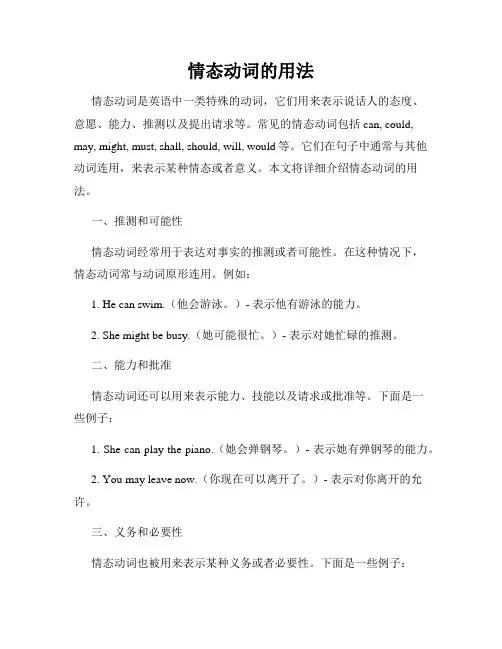
情态动词的用法情态动词是英语中一类特殊的动词,它们用来表示说话人的态度、意愿、能力、推测以及提出请求等。
常见的情态动词包括can, could, may, might, must, shall, should, will, would等。
它们在句子中通常与其他动词连用,来表示某种情态或者意义。
本文将详细介绍情态动词的用法。
一、推测和可能性情态动词经常用于表达对事实的推测或者可能性。
在这种情况下,情态动词常与动词原形连用。
例如:1. He can swim.(他会游泳。
)- 表示他有游泳的能力。
2. She might be busy.(她可能很忙。
)- 表示对她忙碌的推测。
二、能力和批准情态动词还可以用来表示能力、技能以及请求或批准等。
下面是一些例子:1. She can play the piano.(她会弹钢琴。
)- 表示她有弹钢琴的能力。
2. You may leave now.(你现在可以离开了。
)- 表示对你离开的允许。
三、义务和必要性情态动词也被用来表示某种义务或者必要性。
下面是一些例子:1. Students must wear uniforms.(学生必须穿校服。
)- 表示学生有义务穿校服。
2. We should recycle.(我们应该回收。
)- 表示我们有责任进行回收。
四、猜测和推测情态动词有时用于表示对过去的推测或者猜测。
比较常见的是may have和might have。
例如:1. He may have forgotten the keys.(他可能忘记带钥匙了。
)- 表示对他忘记带钥匙的猜测。
2. They might have already left.(他们可能已经离开了。
)- 表示对他们离开的推测。
五、情态动词的否定形式和疑问形式情态动词的否定形式直接在情态动词前加not,疑问形式是将情态动词放在句首。
例如:1. I can't swim.(我不会游泳。
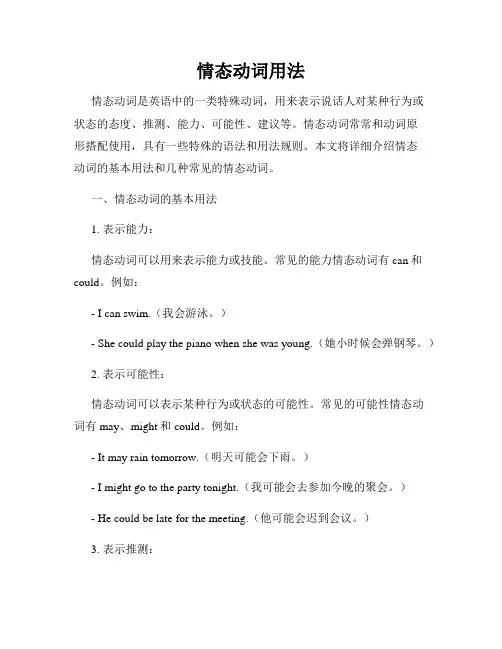
情态动词用法情态动词是英语中的一类特殊动词,用来表示说话人对某种行为或状态的态度、推测、能力、可能性、建议等。
情态动词常常和动词原形搭配使用,具有一些特殊的语法和用法规则。
本文将详细介绍情态动词的基本用法和几种常见的情态动词。
一、情态动词的基本用法1. 表示能力:情态动词可以用来表示能力或技能。
常见的能力情态动词有can和could。
例如:- I can swim.(我会游泳。
)- She could play the piano when she was young.(她小时候会弹钢琴。
)2. 表示可能性:情态动词可以表示某种行为或状态的可能性。
常见的可能性情态动词有may、might和could。
例如:- It may rain tomorrow.(明天可能会下雨。
)- I might go to the party tonight.(我可能会去参加今晚的聚会。
)- He could be late for the meeting.(他可能会迟到会议。
)3. 表示推测:情态动词还可以用来表示说话人对某种事实的推测。
常见的推测情态动词有must、may、might和could。
例如:- He must be tired.(他一定很累。
)- They may be on vacation.(他们可能在度假。
)- She might have forgotten her keys.(她可能忘记带钥匙了。
)- It could snow tonight.(今晚可能会下雪。
)4. 表示允许和禁止:情态动词还可以表示某种行为的允许或禁止。
常见的允许情态动词有can、may和could,常见的禁止情态动词有mustn't和shouldn't。
例如:- You can go now.(你现在可以走了。
)- May I borrow your pen?(我可以借用你的钢笔吗?)- You mustn't smoke here.(你不能在这里抽烟。
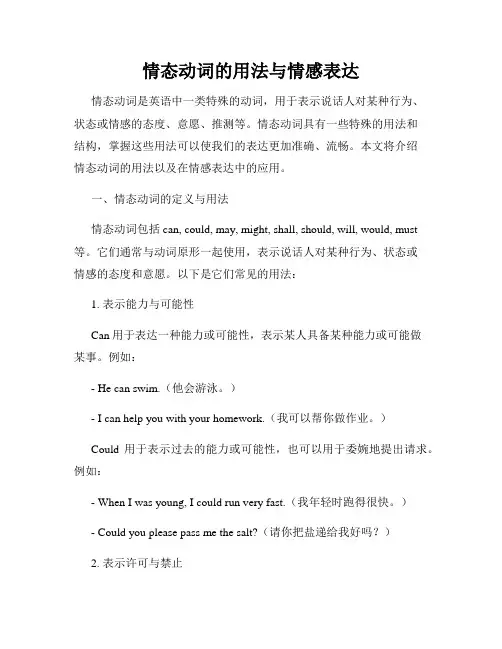
情态动词的用法与情感表达情态动词是英语中一类特殊的动词,用于表示说话人对某种行为、状态或情感的态度、意愿、推测等。
情态动词具有一些特殊的用法和结构,掌握这些用法可以使我们的表达更加准确、流畅。
本文将介绍情态动词的用法以及在情感表达中的应用。
一、情态动词的定义与用法情态动词包括can, could, may, might, shall, should, will, would, must 等。
它们通常与动词原形一起使用,表示说话人对某种行为、状态或情感的态度和意愿。
以下是它们常见的用法:1. 表示能力与可能性Can用于表达一种能力或可能性,表示某人具备某种能力或可能做某事。
例如:- He can swim.(他会游泳。
)- I can help you with your homework.(我可以帮你做作业。
)Could用于表示过去的能力或可能性,也可以用于委婉地提出请求。
例如:- When I was young, I could run very fast.(我年轻时跑得很快。
)- Could you please pass me the salt?(请你把盐递给我好吗?)2. 表示许可与禁止May和might用于表示许可,shall和should用于表示建议或命令。
例如:- May I go to the restroom?(我可以去洗手间吗?)- You should follow the rules.(你应该遵守规则。
)3. 表示推测与可能性Could, may和might用于表示推测、猜测或可能性。
例如:- He could be at home.(他可能在家。
)- It may rain tomorrow.(明天可能会下雨。
)4. 表示义务与建议Should和must用于表示义务、责任或建议。
例如:- We should protect the environment.(我们应该保护环境。
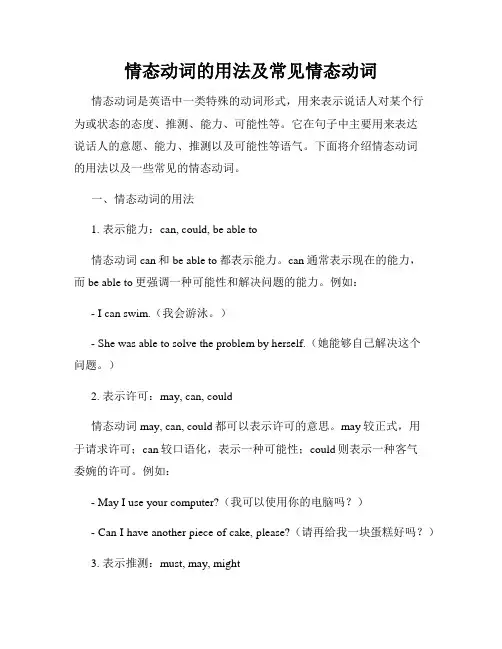
情态动词的用法及常见情态动词情态动词是英语中一类特殊的动词形式,用来表示说话人对某个行为或状态的态度、推测、能力、可能性等。
它在句子中主要用来表达说话人的意愿、能力、推测以及可能性等语气。
下面将介绍情态动词的用法以及一些常见的情态动词。
一、情态动词的用法1. 表示能力:can, could, be able to情态动词can和be able to都表示能力。
can通常表示现在的能力,而be able to更强调一种可能性和解决问题的能力。
例如:- I can swim.(我会游泳。
)- She was able to solve the problem by herself.(她能够自己解决这个问题。
)2. 表示许可:may, can, could情态动词may, can, could都可以表示许可的意思。
may较正式,用于请求许可;can较口语化,表示一种可能性;could则表示一种客气委婉的许可。
例如:- May I use your computer?(我可以使用你的电脑吗?)- Can I have another piece of cake, please?(请再给我一块蛋糕好吗?)3. 表示推测:must, may, might情态动词must表示说话人对某个事实的肯定推测;may和might则表示可能性。
may较肯定,而might较委婉。
例如:- He must be tired, as he worked all day.(他一定很累,因为他整天都在工作。
)- She may/might be late.(她可能会迟到。
)4. 表示必须:must, have to情态动词must表示说话人对某个行为的强制性要求;have to则表示客观上的必须。
例如:- You must finish your homework before you go out.(你必须在出门前完成作业。
)- I have to go to work tomorrow.(我明天必须去上班。
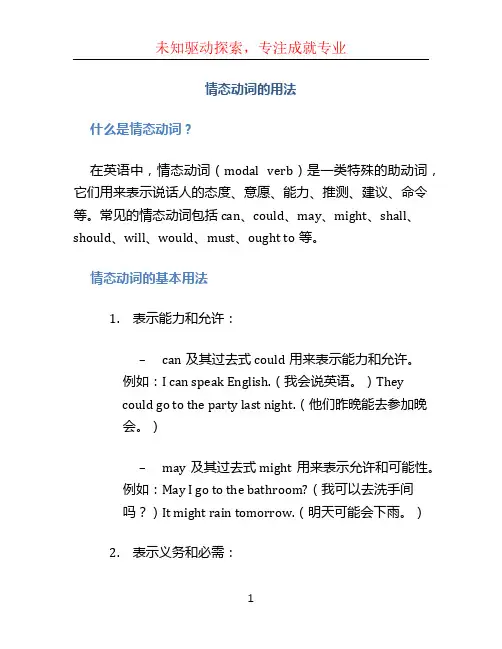
情态动词的用法什么是情态动词?在英语中,情态动词(modal verb)是一类特殊的助动词,它们用来表示说话人的态度、意愿、能力、推测、建议、命令等。
常见的情态动词包括can、could、may、might、shall、should、will、would、must、ought to等。
情态动词的基本用法1.表示能力和允许:–can及其过去式could用来表示能力和允许。
例如:I can speak English.(我会说英语。
)Theycould go to the party last night.(他们昨晚能去参加晚会。
)–may及其过去式might用来表示允许和可能性。
例如:May I go to the bathroom?(我可以去洗手间吗?)It might rain tomorrow.(明天可能会下雨。
)2.表示义务和必需:–must用来表示义务和必需。
例如:You must finish your homework before playing games.(你必须在玩游戏之前完成作业。
)–should用来表示应该和建议。
例如:She should eat more vegetables for her health.(她应该多吃蔬菜保护健康。
)3.表示推测和肯定:–will用来表示未来意愿和不可避免的行为。
例如:I will help you with your presentation.(我会帮你做演讲。
)–would用来表示假设和委婉表达。
例如:If I had more time, I would travel around the world.(如果我有更多时间,我会环游世界。
)情态动词的用法注意事项1.情态动词后接不带to的原形动词,即不加动词的第三人称单数-s形式。
例如:He can swim well.(他游泳游得很好。
)They should study hard.(他们应该努力学习。
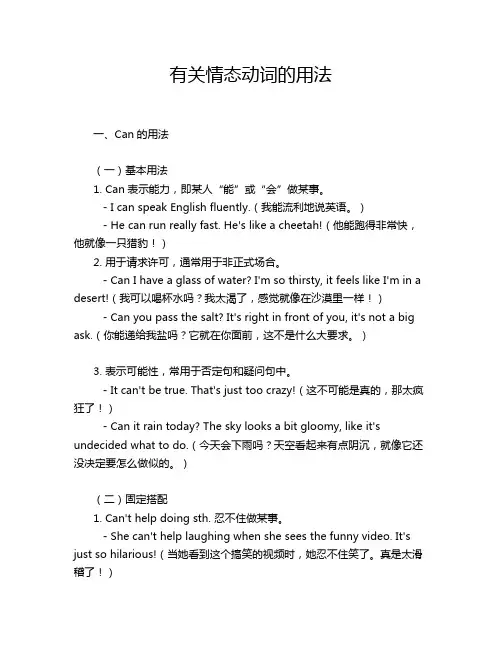
有关情态动词的用法一、Can的用法(一)基本用法1. Can表示能力,即某人“能”或“会”做某事。
- I can speak English fluently.(我能流利地说英语。
)- He can run really fast. He's like a cheetah!(他能跑得非常快,他就像一只猎豹!)2. 用于请求许可,通常用于非正式场合。
- Can I have a glass of water? I'm so thirsty, it feels like I'm in a desert!(我可以喝杯水吗?我太渴了,感觉就像在沙漠里一样!) - Can you pass the salt? It's right in front of you, it's not a big ask.(你能递给我盐吗?它就在你面前,这不是什么大要求。
)3. 表示可能性,常用于否定句和疑问句中。
- It can't be true. That's just too crazy!(这不可能是真的,那太疯狂了!)- Can it rain today? The sky looks a bit gloomy, like it's undecided what to do.(今天会下雨吗?天空看起来有点阴沉,就像它还没决定要怎么做似的。
)(二)固定搭配1. Can't help doing sth. 忍不住做某事。
- She can't help laughing when she sees the funny video. It's just so hilarious!(当她看到这个搞笑的视频时,她忍不住笑了。
真是太滑稽了!)- I can't help feeling excited about the uing trip. It's like a dreaming true!(对于即将到来的旅行,我忍不住感到兴奋。
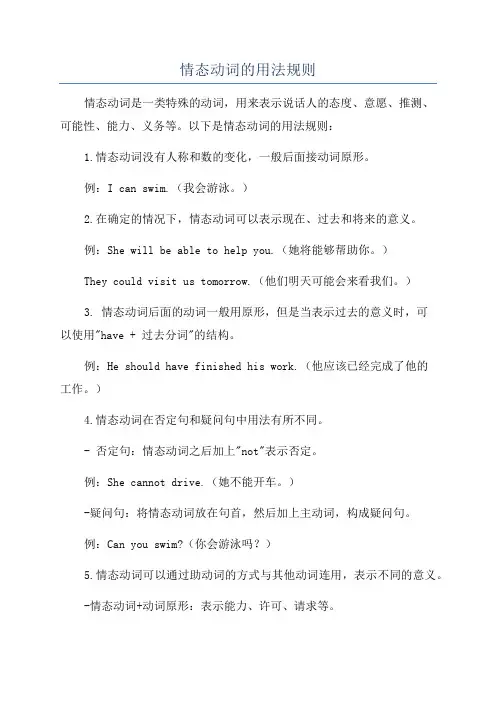
情态动词的用法规则情态动词是一类特殊的动词,用来表示说话人的态度、意愿、推测、可能性、能力、义务等。
以下是情态动词的用法规则:1.情态动词没有人称和数的变化,一般后面接动词原形。
例:I can swim.(我会游泳。
)2.在确定的情况下,情态动词可以表示现在、过去和将来的意义。
例:She will be able to help you.(她将能够帮助你。
)They could visit us tomorrow.(他们明天可能会来看我们。
)3. 情态动词后面的动词一般用原形,但是当表示过去的意义时,可以使用"have + 过去分词"的结构。
例:He should have finished his work.(他应该已经完成了他的工作。
)4.情态动词在否定句和疑问句中用法有所不同。
- 否定句:情态动词之后加上"not"表示否定。
例:She cannot drive.(她不能开车。
)-疑问句:将情态动词放在句首,然后加上主动词,构成疑问句。
例:Can you swim?(你会游泳吗?)5.情态动词可以通过助动词的方式与其他动词连用,表示不同的意义。
-情态动词+动词原形:表示能力、许可、请求等。
例:I can play the guitar.(我会弹吉他。
)May I borrow your pen?(我可以借你的笔吗?)- 情态动词 + have + 过去分词:表示推测、责备等。
例:They should have finished their homework.(他们应该已经完成了作业。
)需要注意的是,不同的情态动词有不同的意义和用法规则,因此在具体运用时需要根据相关的语境进行理解和应用。
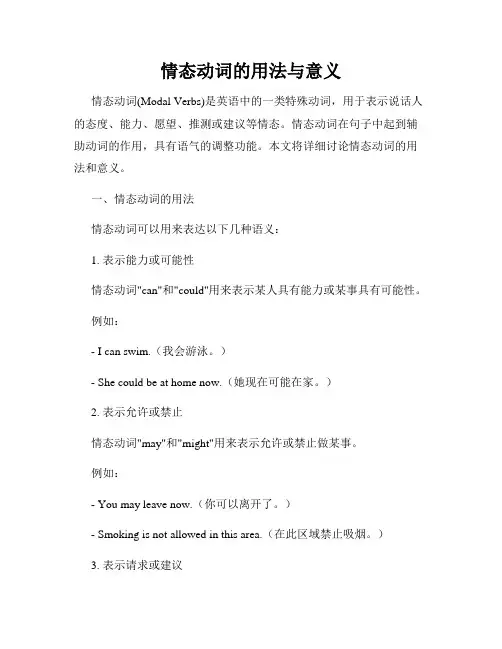
情态动词的用法与意义情态动词(Modal Verbs)是英语中的一类特殊动词,用于表示说话人的态度、能力、愿望、推测或建议等情态。
情态动词在句子中起到辅助动词的作用,具有语气的调整功能。
本文将详细讨论情态动词的用法和意义。
一、情态动词的用法情态动词可以用来表达以下几种语义:1. 表示能力或可能性情态动词"can"和"could"用来表示某人具有能力或某事具有可能性。
例如:- I can swim.(我会游泳。
)- She could be at home now.(她现在可能在家。
)2. 表示允许或禁止情态动词"may"和"might"用来表示允许或禁止做某事。
例如:- You may leave now.(你可以离开了。
)- Smoking is not allowed in this area.(在此区域禁止吸烟。
)3. 表示请求或建议情态动词"can"、"could"和"would"用来表示请求或建议。
例如:- Can you please help me with this?(你能帮我个忙吗?)- Could you turn down the volume a little?(你可以把声音调小点吗?)- I would suggest studying more for the exam.(我建议考试时多学习一些。
)4. 表示推测或猜测情态动词"must"、"might"和"could"用来表示推测、猜测或假设。
例如:- He must be tired after working all day.(他一天工作下来一定累了。
)- It might rain tomorrow.(明天可能会下雨。
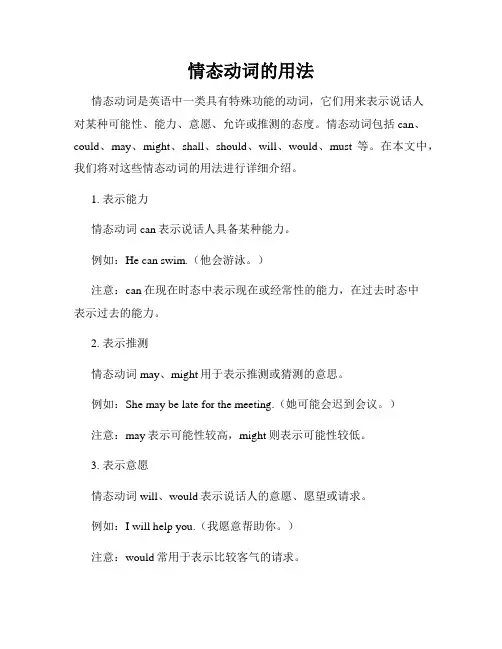
情态动词的用法情态动词是英语中一类具有特殊功能的动词,它们用来表示说话人对某种可能性、能力、意愿、允许或推测的态度。
情态动词包括can、could、may、might、shall、should、will、would、must等。
在本文中,我们将对这些情态动词的用法进行详细介绍。
1. 表示能力情态动词can表示说话人具备某种能力。
例如:He can swim.(他会游泳。
)注意:can在现在时态中表示现在或经常性的能力,在过去时态中表示过去的能力。
2. 表示推测情态动词may、might用于表示推测或猜测的意思。
例如:She may be late for the meeting.(她可能会迟到会议。
)注意:may表示可能性较高,might则表示可能性较低。
3. 表示意愿情态动词will、would表示说话人的意愿、愿望或请求。
例如:I will help you.(我愿意帮助你。
)注意:would常用于表示比较客气的请求。
4. 表示推测的过去情态动词must常用于表示对过去情况的推测或肯定。
例如:He must have missed the bus.(他肯定错过了公交车。
)注意:must用于表示对过去情况的肯定,而might用于表示对过去情况的推测。
5. 表示义务或必要性情态动词must表示对义务、必要性或确定性的肯定。
例如:You must finish your homework.(你必须完成作业。
)6. 表示建议或应该情态动词should表示建议或应该。
例如:You should go to bed early.(你应该早点睡觉。
)注意:should还可以表示对过去情况的推测,例如:He should have arrived by now.(他现在应该已经到达了。
)7. 表示允许或许可情态动词can与may可以用于表示许可或允许。
例如:Can I borrow your pen?(我可以借你的钢笔吗?)8. 表示可能性情态动词could用于表示可能性。
情态动词的用法归纳情态动词是一类帮助表达情态、态度、推测、建议和能力等含义的动词。
以下是情态动词的常见用法:1. 表示能力与能力推测:- can例句:I can swim.(我会游泳。
)- could例句:He could swim when he was five.(他五岁时就会游泳了。
)2. 表示许可与禁止:- may例句:You may use my phone.(你可以用我的手机。
)- might例句:I might go to the party tonight.(我可能今晚去参加派对。
)- mustn't例句:You mustn't smoke here.(你不能在这里抽烟。
)3. 表示推测与推测的否定:- may例句:He may be late.(他可能会迟到。
)- might例句:It might rain later.(天后可能会下雨。
)- can't例句:They can't be at home.(他们不可能在家。
)4. 表示义务与责任:- must例句:We must finish our homework.(我们必须完成作业。
)- have to例句:I have to go to work early tomorrow.(我明天必须早点去上班。
)5. 表示愿望与建议:- should例句:You should exercise regularly.(你应该经常锻炼。
)- ought to例句:They ought to help others.(他们应该帮助别人。
)6. 表示推荐与要求:- would like例句:I would like to have a cup of tea.(我想要一杯茶。
)- need例句:You need to finish this report by tomorrow.(你需要在明天之前完成这份报告。
情态动词用法归纳总结情态动词是一类用来表示说话人的态度、观点和意愿的动词,具有一定的语法特点。
以下是情态动词的一些常见用法归纳总结:1.表示能力、可能性和推测:- Can: 表示能力和可能性,用于肯定句;例如:“I can swim.”(我会游泳。
)- Could: 表示能力和可能性,用于疑问句和否定句;例如:“Could you help me?”(你能帮助我吗?)- May/might: 表示可能性和推测;例如:“He may be busy.”(他可能很忙。
)- Must: 表示强烈的推测或肯定;例如:“He must be tired.”(他一定很累。
)2.表示许可和建议:- Can: 表示允许和禁止,用于肯定句;例如:“You can go now.”(你现在可以走了。
)- Could: 表示请求允许,用于疑问句和否定句;例如:“Could I borrow your pen?”(我可以借用你的笔吗?)- May/might: 表示请求允许;例如:“May I use your phone?”(我可以用一下你的手机吗?)- Should: 表示建议;例如:“You should eat more vegetables.”(你应该多吃蔬菜。
)3.表示义务和推测:- Must: 表示必须和义务;例如:“You must finish your homework.”(你必须完成作业。
)- Have to: 表示必须和义务;例如:“I have to go to work tomorrow.”(我明天必须去上班。
)4.表示可能性和意愿:- Can: 表示可能性和意愿,用于肯定句;例如:“I can help you with that.”(我可以帮你做那个。
)- Could: 表示可能性和意愿,用于疑问句和否定句;例如:“Could you please pass me the salt?”(请你把盐递给我好吗?)- May/might: 表示可能性和意愿;例如:“I may go to the party tonight.”(今晚我可能会去参加派对。
情态动词用法归纳一、引言(一)情态动词的定义和分类(二)情态动词的基本用法和特点二、情态动词的具体用法(一)can 和 could 的用法 1. 表示能力 2. 表示可能性 3. 表示请求和允许 4. 表示推测 5. could 的其他用法(二)may 和 might 的用法 1. 表示可能性 2. 表示请求和允许 3. 表示祝愿 4. might 的其他用法(三)must 和 have to 的用法 1. 表示必须 2. 表示推测 3. have to 的其他用法(四)should 和 ought to 的用法 1. 表示应该 2. 表示推测 3. 表示建议 4. 表示责任和义务(五)will 和 would 的用法 1. 表示意愿 2. 表示请求和邀请 3. 表示习惯和倾向性 4. 表示推测 5. would 的其他用法(六)shall 的用法 1. 用于第一人称表示将来 2. 用于第二、三人称表示命令、警告、允诺等 3. 用于征求意见(七)need 的用法 1. 作为情态动词的用法 2. 作为实义动词的用法(八)dare 的用法 1. 作为情态动词的用法 2. 作为实义动词的用法三、情态动词的时态和语态(一)情态动词的时态 1. 一般现在时 2. 一般过去时 3. 现在进行时 4. 过去进行时 5. 现在完成时 6. 过去完成时(二)情态动词的语态 1. 主动语态 2. 被动语态四、情态动词的否定形式和疑问形式(一)情态动词的否定形式 1. 直接在情态动词后加 not 2. 用情态动词的缩写形式加 not (二)情态动词的疑问形式 1. 将情态动词提前 2. 用情态动词的缩写形式提前五、情态动词的特殊用法(一)情态动词与其他动词的搭配 1. 情态动词+动词原形 2. 情态动词+be+形容词/名词3. 情态动词+have+过去分词(二)情态动词的省略 1. 在口语中,某些情态动词可以省略 2. 在某些情况下,情态动词的后面可以省略动词原形(三)情态动词的强调 1. 通过重读情态动词来强调 2. 使用 do/does/did 来强调六、情态动词的比较和区别(一)can 和 be able to 的区别 1. 表示能力时的区别 2. 时态和语态的区别(二)may 和 might 的区别 1. 表示可能性时的区别 2. 表示请求和允许时的区别(三)must 和 have to 的区别 1. 表示必须时的区别 2. 时态和语态的区别(四)should 和 ought to 的区别 1. 表示应该时的区别 2. 语气上的区别(五)will 和 would 的区别 1. 表示意愿时的区别 2. 表示习惯和倾向性时的区别(六)shall 和 will 的区别 1. 用于第一人称时的区别 2. 用于第二、三人称时的区别七、情态动词的练习和应用(一)情态动词的练习题 1. 选择题 2. 填空题 3. 改错题 4. 翻译题(二)情态动词的应用场景 1. 日常生活中的应用 2. 商务场合中的应用 3. 学术写作中的应用八、结论(一)情态动词的重要性和作用(二)情态动词的用法归纳和总结(三)对情态动词的进一步学习和研究的展望。
情态动词的用法和意义情态动词是英语中一类特殊的动词,用来表示说话人的态度、情感、推测或建议等。
情态动词没有人称和数的变化,后面接动词原形。
本文将详细介绍情态动词的用法和意义。
一、情态动词的定义情态动词是一种助动词,用来表达说话人态度、情感、推测或建议等。
常见的情态动词包括can, could, may, might, must, shall, should, will, would等。
二、情态动词的用法1. 表示能力和许可情态动词can和could用来表示能力和许可。
例如:- She can speak three languages.(她会说三种语言。
)- Could I leave early today?(我今天可以早退吗?)2. 表示可能性和推测情态动词may, might, must, can, could用来表示可能性和推测。
例如:- It may rain tomorrow.(明天可能会下雨。
)- He must be tired after working all day.(他一整天工作下来一定很累。
)3. 表示义务和必要性情态动词must和should用来表示义务和必要性。
例如:- You must finish your homework before going out to play.(你必须在出去玩之前完成作业。
)- We should recycle to protect the environment.(我们应该回收垃圾来保护环境。
)4. 表示意愿和请求情态动词will和would用来表示意愿和请求。
例如:- I will help you with your project.(我愿意帮助你完成项目。
)- Would you please pass me the salt?(请你把盐递给我好吗?)5. 表示建议和命令情态动词should和shall用来表示建议和命令。
können1.表示主观上有能力做某事,用直陈式,意为“能够”Er kann fließend Deutsch sprechen.他能流利地说德语。
Sie kann gut Tennis spielen.她能打一手好网球。
Wir können heute die Aufgaben erledigen.我们今天能完成任务。
2.表示一种客观的可能性In einem Jahr kann er das Haus bestimmt kaufen.一年后,他肯定能买下这所房子。
Dieses Ozeanschriff kann 800 Passagiere aufnehmen.这艘海轮能载800名旅客。
Ich konnte diese Frage nicht beantworten.我当时不可能回答这一问题。
3.表示猜测Er kann in die Stadt gefahren sein.他可能乘车进城去了。
Sie können sich schon verabredet haben.他们可能早就约定好了。
4.表示允许,许可(代替dürfen)Sie können jetzt gehen.(= dürfen)您现在可以走了。
5.表示礼貌用语,语言委婉,用第二虚拟式Könnte ich einen Blick in das Protokoll werfen?我可不可以看一下记录?müssen1.表示一种必要性,有义务,用直陈式,意为“必须”,“不得不”Er muss heute noch seine Mutter von Bahnhof abholen.他今天还得去车站接他母亲。
V or den Ferien muss ich noch eine Menge Aufgaben erledigen,放假之前,我还必须完成一大堆任务。
Nach dem Unfall musste ich zu Fuß nach Hause gehen.事故发生后,我曾不得不步行回家。
Man muss die Arbeitsdisziplin einhalten.人们必须遵守劳动纪律。
说明:这一用法的否定语气,或带有nur, kaum表示必要的语气,多数用brauchen+zu+不定式。
Du brauchst es ihr nicht zu sagen.你不必将此事告诉她。
Sie brauchen es mir nur zu sagen.您只要对我说就行了。
2.表示一种要求。
Du musst dir den Film ansehen.(=Sieh dir den Film an!)你得看这部电影。
说明:这种形式是命令式的替代形式。
3.表示一种极有把握的猜测,可用直陈式或第二虚拟式,相当于汉语“准是”,“肯定”的语气。
Peter muss heute krank sein, sonst geht er pünktlich zum Unterricht.彼得今天肯定病了,要不然他总是准时前来上课。
Sie muss es vergessen haben, sonst wäre sie schon hier.她准是忘了此事,要不然她早就来到这儿了。
4.表示一种不现实的愿望,用第二虚拟式。
Man müsste noch einmal zwanzig sein!(=Wenn man doch noch einmal zwanzig wäre!)要是还是20岁该多好啊!mögen1.表示愿望与兴趣,总是用第二虚拟式möchten.Ich möchte ihn gern kennen lernen.我很想结识他。
Möchtest du mit ins Kino gehen?你想一起去看电影吗?说明:这种形式只用于现在时,möchten的过去式则使用动词wollen的过去式。
Ich wollte sie fragen, aber er hielt mich zurück.我原想问他,但他阻止了我。
在否定句中,则常常用直陈式,不用虚拟式。
Ich mag nichts essen.我什么也不想吃。
Sie mögen nicht mit dem Zug fahren.他们不想乘火车去。
2. 表示猜测Das mag wahr sein.这可能是真的。
Wer mag das sein?这可能是谁呢?Wer mag ihm das gesagt haben?是谁会把这事告诉了他呢?Er mag etwa 30 Jahre alt sein.他可能30岁左右。
Es mag sein, dass er es nicht richtig verstanden hat.可能他并没有正确理解此事。
3. 表示让步,意为“不管”,“无论”,用直陈式或第一虚拟式。
Was er auch sagen mag(möge), kann ich ihm nicht glauben.不管他说什么,我都不相信他。
Mag es auch kalt sein, zieht er keinen Mantel an.尽管天气很冷,他仍不穿大衣。
4. 表示强烈,且有可能实现的愿望,用第一虚拟式。
Möge Ihnen das Neue Jahr viel Glück bringen!愿新年给您带来幸福!(恭贺新禧!)Möge es morgen schön werden!但愿明天是好天气!5.将直接引语的命令句改为间接引语,用第一虚拟式。
Er hat mir gesagt, ich möge nicht auf ihn warten.(=Er hat mir gesagt:“ Warten Sie bitte nicht auf mich!“)他对我说,请我不要等他。
dürfen1.表示许可,允许与有权做什么,意为:“可以”,“许可”,“允许”。
Darf ich Sie mal besuchen? 我可以拜访您吗?(=Erlauben Sie mir, dass ich Sie mal besuchen?)Darf ich mir das Buch nehmen?我可以要这本书吗?Sie dürfen in der Prüfung ein Wörterbuch benutzen.考试时,您可以用字典。
2.表示一种禁止,总是以否定形式出现,意为“不许可”。
Hier darf man nicht rauchen.这儿不许抽烟。
(=Es ist nicht erlaubt, hier zu rauchen.)/(=Hier darf nicht geraucht werden.)Bei Rot darf man die Straße nicht überqueren.红灯时不许穿越马路。
Diese Zeitung darf nicht erscheinen.这份报纸不准出版。
3.表示客气的问询或请求,常用于问话中,如用第二虚拟式更显得客气。
Was darf es sein?您要些什么?(售货员对顾客问话)Darf es etwas mehr sein?多一点行吗?(售货员对顾客的询问)Dürfte ich Sie mal stören?我可不可以打扰您一下?4.表示一种消极指示Man darf Blumen in der Sonne gießen.太阳照射下不能浇花。
5.表示一种没有把握的猜测,用第二虚拟式。
Morgen dürfte es regnen.明天可能下雨。
Er dürfte in Berlin angekommen sein.他很可能已抵达柏林了。
Es dürfte nicht leicht sein, ihn zu überzeugen.要说服他,可能不太容易。
Er dürfte letzte Woche diese Nachricht gehabt haben.他或许上周已知这一消息。
说明:用dürfen表示猜测,其猜测程度比用können 与mögen要高。
wollen1.表示愿望,意志,打算与意图。
Ich will dieses Buch kaufen.我想要购买这本书。
Er will Lehrer werden.他想当老师。
Der Regen wollte kein Ende nehmen.雨下个没完。
Ich will morgen abreisen.我打算明天动身。
Er will bis morgen die Antwort haben.他要求至迟明天给他答复。
2.表示一种命令与请求,语气比较缓和,常用第一人称复数。
Wir wollen gehen!我们走吧!Wollen Sie bitte Platz nehmen!您请坐!说明:在会话中,如用第二虚拟式,表示客气地提出要求。
Ich wollte Sie fragen, ob.....我想问问您,是否....Wir wollten Sie bitten, dass.....我们想请您.....3. 表示某一未来行动出现前的愿望Ich will hier auf dich warten, bis du kommst.我将在此等你,直到你来。
(=Ich werde hier auf dich warten, bis du kommst.)4.用来转达他人的话,并对其真伪表示怀疑,具有behaupten(声称)之意,常用现在完成时。
Er will sie später getroffen haben.他声称,他后来曾见过她。
(=Er behaupt, sie später getroffen zu haben.)Er will schon um 8 Uhr morgens im Bro gewesen sein.他硬说,他早上八点钟已经在办公室了。
5.用在条件句中,代替würden,用第二虚拟式。
Wollten wir auf alle Fragen ausfühlich eingehen, würde es zu weit führen.如果详尽谈论所有问题,那就扯得太远了。
Ich würde mich freuen, wenn Sie mich morgen besuchen wolllten.如果您明天来看我,我将十分高兴。